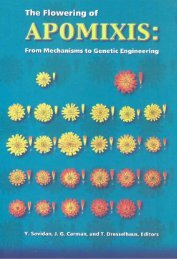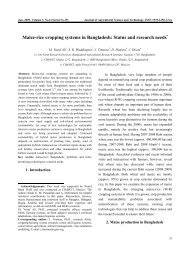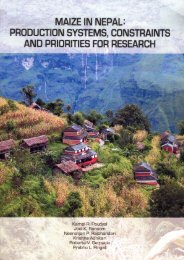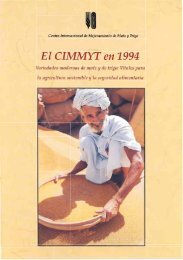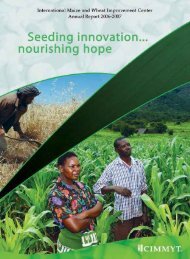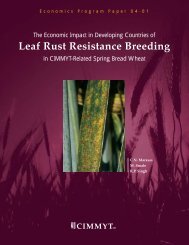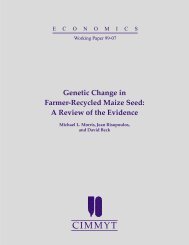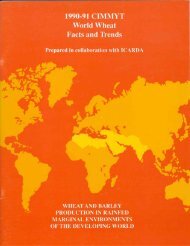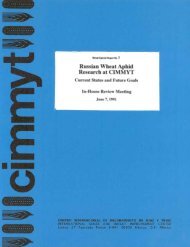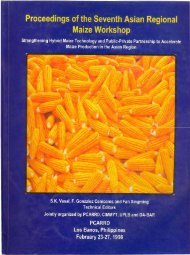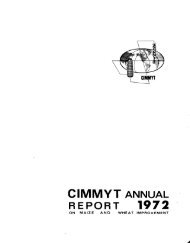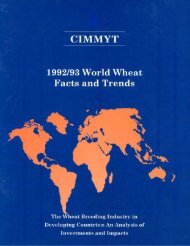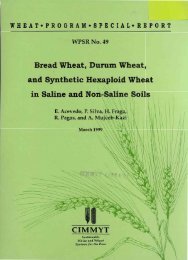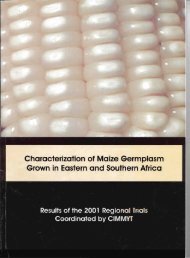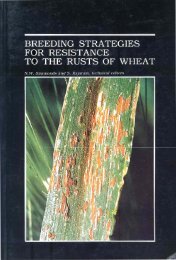Research Highlights of the CIMMYT Wheat Program 1999-2000
Research Highlights of the CIMMYT Wheat Program 1999-2000
Research Highlights of the CIMMYT Wheat Program 1999-2000
Create successful ePaper yourself
Turn your PDF publications into a flip-book with our unique Google optimized e-Paper software.
<strong>the</strong> pivotal role <strong>of</strong> Kulumsa in <strong>the</strong> regional<br />
networks. One surprise finding was that a<br />
significant area in eastern South Africa exhibited<br />
climatic similarity to Kulumsa, yet this is not a<br />
wheat producing region. This prompted an<br />
investigation into what additional factors were<br />
involved in this particular region. It was<br />
discovered that several factors were involved,<br />
including difficult terrain, wheat not being a crop<br />
<strong>of</strong> choice for traditional smallholders, and high<br />
levels <strong>of</strong> commercial production in southwestern<br />
areas. This highlights <strong>the</strong> fact that factors,<br />
including socio-economic issues, must also be<br />
considered when examining crop distribution.<br />
Empowering Women Farmers<br />
Ano<strong>the</strong>r important aspect <strong>of</strong> EACP and ECAMAW<br />
is an emphasis on empowering <strong>the</strong> region’s women<br />
farmers as well as sensitizing <strong>the</strong> researchers (male<br />
and female) who work on <strong>the</strong>ir behalf. The<br />
importance <strong>of</strong> women to Africa’s agricultural<br />
economy is indisputable, but many researchers and<br />
extension workers have not previously received<br />
training in methods that would ensure that<br />
research benefits female producers. To address this<br />
problem, ECAMAW launched a series <strong>of</strong> gender<br />
analysis and training initiatives in concert with <strong>the</strong><br />
Centre for Women’s Studies and Gender Analysis,<br />
Egerton University, Kenya. Over <strong>the</strong> last three<br />
years, <strong>the</strong>se initiatives have included:<br />
• Participation <strong>of</strong> <strong>the</strong> ECAMAW steering committee<br />
in a gender orientation training session.<br />
• A course entitled “Training <strong>of</strong> trainers in gender<br />
analysis and planning for <strong>the</strong> ECAMAW research<br />
network” empowered researchers to conduct<br />
gender analysis training for colleagues in <strong>the</strong>ir<br />
respective national programs.<br />
• Of <strong>the</strong> 228 people included in ECAMAWsponsored<br />
training activities during 1997-<strong>1999</strong>, 49<br />
(21.7%) were women—more than <strong>the</strong> proportion <strong>of</strong><br />
female scientists (15.3%) in national maize and<br />
wheat research programs in <strong>the</strong> region.<br />
• Reflecting an initiative to empower women<br />
scientists, women researchers led 28 experiments<br />
funded by <strong>the</strong> network’s small grants program<br />
during 1997-<strong>1999</strong>.<br />
• More studies on gender issues in agriculture are<br />
being undertaken. During 1998, <strong>the</strong> network<br />
funded a syn<strong>the</strong>sis <strong>of</strong> farm-level survey<br />
information generated in four countries,<br />
highlighting <strong>the</strong> roles <strong>of</strong> women in maize and<br />
wheat cropping systems and identifying research<br />
domains requiring gender-differentiated<br />
approaches. Since 1997, six studies on <strong>the</strong> adoption<br />
<strong>of</strong> technologies, including <strong>the</strong> collection <strong>of</strong> genderdisaggregated<br />
data, have been funded by <strong>the</strong><br />
network’s small grants program.<br />
• All research proposals submitted to ECAMAW’s<br />
small grants program are required to include an<br />
analysis <strong>of</strong> <strong>the</strong> gender dimensions and implications<br />
<strong>of</strong> proposed technological interventions.<br />
• More than 25 research proposals funded each year<br />
by this program have included a gender analysis<br />
component.<br />
• Under <strong>the</strong> small grants program, 31 projects have<br />
examined issues that are significant to women<br />
farmers (e.g., evaluation <strong>of</strong> technologies for soil<br />
fertility management; <strong>the</strong> effects <strong>of</strong> green manure<br />
and cropping sequences on soil fertility; <strong>the</strong> role <strong>of</strong><br />
drought tolerant legumes in cereal production<br />
systems; participatory evaluation <strong>of</strong> bread wheat<br />
technologies; on-farm evaluation <strong>of</strong> integrated crop<br />
management practices for weed control; and<br />
informal seed production, distribution, and<br />
diffusion for resource poor farmers).<br />
60



